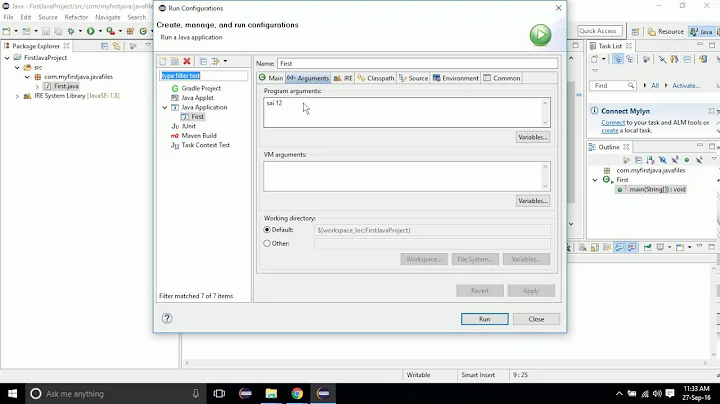How to pass command line parameters from a file
Solution 1
With most shells, you can insert the contents of a file into a command line with $(<filename):
./myprogram $(<arguments.dat)
If your shell doesn't support that, then one of the older ways will work:
./myprogram $(cat arguments.dat)
./myprogram `cat arguments.dat` # need this one with csh/tcsh
(You do know the difference between command line arguments and file input, right? Why would you expect to pipe command line arguments into a program?)
Solution 2
xargs is your answer:
cat arguments.dat | xargs ./myprogram
Or easier:
xargs -a arguments.dat ./myprogram
Check the manual for the many ways to customize xargs. For example, you can read line-by-line rather than by word, and you can use the arguments in more complex replacements.
Solution 3
If You Don't Want Arguments To Be Silently Split
...which is to say: The below answers apply to cases where it wouldn't be acceptable for ./myprogram --first-argument "first value" to be silently changed into ./myprogram --first-argument; ./myprogram "first value".
If your arguments are one-to-a-line literals
That is, if your input looks like:
--first-argument
first value
--second-argument
second value
and you mean this to run:
./myprogram --first-argument "first value" --second-argument "second value"
...then you should use (with bash 4.0 or later):
readarray -t args <arguments.dat
./myprogram "${args[@]}"
...or (for bash 3.x as well):
args=( )
while IFS= read -r arg; do
args+=( "$arg" )
done <arguments.dat
./myprogram "${args[@]}"
If your arguments are provided with quotes or escaping to distinguish them
That is, if your file contains something like (note that newlines and unquoted spaces behave identically here):
--first-argument "first value"
--second-argument "second value"
...and you mean this to run:
./myprogram --first-argument "first value" --second-argument "second value"
...then you should use:
args=( )
while IFS= read -r -d '' arg; do
args+=( "$arg" )
done < <(xargs printf '%s\0' <arguments.dat)
If you control your argument format
Use NUL-delimited values. That is, create the file as so:
printf '%s\0' "argument one" "argument two" >arguments.dat
...and parse it as follows:
args=( )
while IFS= read -r -d '' arg; do
args+=( "$arg" )
done <arguments.dat
./myprogram "${args[@]}"
This will work with all possible argument values, even ones with literal newlines, literal quotes, literal backslashes, or other nonprintable characters. (Literal NULs are not possible in UNIX command lines, since command lines are composed of NUL-terminated strings; thus, NUL is the only character which is completely safe to use to unambiguously separate arguments in a string).
If Splitting Arguments Across Invocations Is Desired
This subsection is relevant if the desired result (when there are more arguments in your file than can be passed to an invocation of your program) is multiple distinct invocations of the program, each one receiving a subset of arguments. This is a family of cases where xargs is the right tool for the job.
If on a GNU platform, you may want to run xargs -a arguments.dat instead of redirecting stdin; however, this isn't supported with BSD xargs (as on MacOS), and so is not demonstrated here.
If your arguments are one-to-a-line literals
With GNU xargs (most Linux platforms):
xargs -d $'\n' ./myprogram <arguments.dat
With BSD xargs (MacOS, FreeBSD/OpenBSD/etc):
xargs -0 ./myprogram < <(tr '\n' '\0' <arguments.dat)
If your arguments are provided with quotes or escaping to distinguish them
xargs ./myprogram <arguments.dat
If you've generated NUL-delimited inputs
xargs -0 ./myprogram <arguments.dat
Related videos on Youtube
Jonatas Eduardo
Updated on May 30, 2022Comments
-
Jonatas Eduardo about 2 years
I have a C program that reads command line arguments from argv. Is it possible to make a pipe to redirect the contents of a file as command line arguments to my program? Suppose I have a file
arguments.datwith this content:0 0.2 302 0And I want my program to be called with:
./myprogram 0 0.2 302 0I tried the following:
cat arguments.dat | ./myprogramwithout success.
-
osgx almost 13 years"older ways" will not split arguments. All data from file will be loaded as single argument.
-
caf almost 13 years@osgx: That is simply untrue. To make it a single argument, you would need to put it inside double quotes.
-
Charles Duffy about 6 yearsThere are some caveats here -- if your file contains more arguments than fit on a single command line (and keep in mind that environment variables and command-line arguments use the same space -- so
exporting too many, or too-large, command-line variables reduces the maximum command- line length),xargswill run./myprogrammore than once, splitting the arguments across the invocations. -
Charles Duffy about 6 yearsIf your file contains
"first argument" "second argument", this would pass"firstas one argument,argument"as second,"secondas third. If it contains,*.txt, it'll replace that with a list of text files, rather than keeping it literal. If the file contains"*.txt", the quotes will be passed as a literal part of the string (if the user doesn't havenullgloborfailglobcausing the prior to be treated as a failed glob... well, failed if there aren't any files with names that start and end with literal double-quote characters). -
Kerrek SB about 6 years@CharlesDuffy: Good point. That may be either a bug or a much-wanted feature, depending on the use case. In any case, I added another mechanism.
-
Kerrek SB about 6 years@CharlesDuffy: Yes, indeed. Bash also has a way to let you edit a command line with an editor. And
xargshas many advanced ways of operating that let you quote the arguments and read line-wise and all that. -
Kerrek SB about 6 years@CharlesDuffy: Yeah, that's definitely what I'd do in a reusable script. If it's for a one-off use, though, where you roughly know what the arguments are, the simple xargs is often all you need.
-
Charles Duffy about 6 yearsSure. I'm trying to make an argument about correctness because a StackOverflow answer is by nature reusable -- it's (ideally) going to be read and used by a whole lot of people (in a lot of different scenarios, some of whose use cases may vary from the OP's), so time and effort spent on getting the details right is well worthwhile. That said, if I should just go add a competing answer, feel free to tell me so. :)
-
Kerrek SB about 6 years@CharlesDuffy: With
ls -1I'd usexargs -d \n... but why don' you post an answer? That should definitely go into a proper answer.







